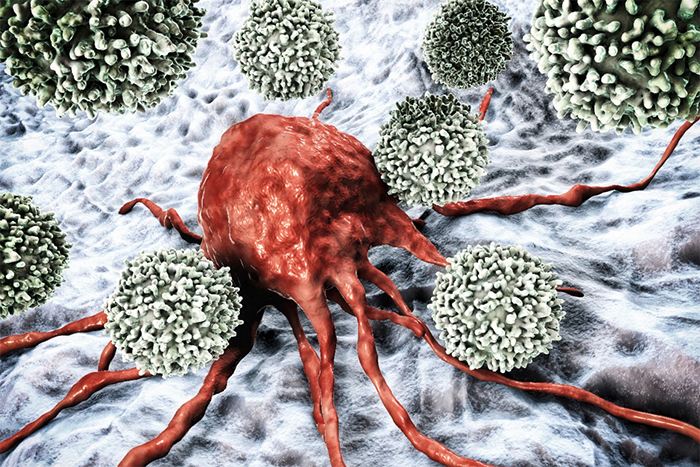
Recently, Di Zhu, professor at the School of Pharmacy, and Yuxiong Feng, professor at Zhejiang University, have made new progress in the field of colorectal cancer immunotherapy. This research finding was published online in Science Advances, with the title of "Pharmacological inhibition of β-catenin/BCL9 interaction overcomes resistance to immune checkpoint blockades by modulating Treg cells". Mei Feng, master student and Li Xia, Ph.D. student at Fudan University School of Pharmacy, and Joy Jin, undergraduate student at Harvard, are co-first authors of this article.
Colorectal cancer ranks as the 4th cause of cancer-related death in China. Traditional treatments such as surgery, radiotherapy and chemotherapy play an important role in the treatment of early colorectal cancer, but for late stage metastatic advanced colorectal cancer, viable treatment option is very limited. In addition, the response rate of checkpoint inhibitors in colorectal cancer is very low. Therefore, identifying novel targets and discovering effective drugs is critical to improve the overall outcome of colorectal cancer.
In colorectal cancer, more than 90% of patients have deregulation of the Wnt/β-catenin pathway. Over activation of the Wnt pathway regulates tumor cell proliferation, survival and metastasis. In addition, Wnt signaling also plays an important role in the modulation of tumor immune microenvironment, which hampers the lymphocytes tumor infiltration and proliferation of various types of T cells. Therefore, the development of effective Wnt signaling pathway inhibitors not only has the potential of monotherapy treatment for colorectal cancer, but also has the potential to regulate the immune microenvironment of tumors, thereby improving the response rate of PD-1 antibodies.
Dr. Zhu previously reported in Science Translational Medicine that the inhibition of Wnt signaling pathway in tumors could be achieved by blocking the co-activator BCL9 of β-catenin with the “stapled” peptide--SAH-BCL9.
In this collaborative study, based on the previous work, the research team obtained a specific hydrocarbon stapled hydrocarbon staple peptide, hsBCL9CT24, to inhibit interaction of BCL9 and β-catenin, in large-scale chemical modification and screening experiments. hsBCL9CT24 strongly and effectively inhibits the activity of the Wnt pathway and shows robust anti-tumor activity in a variety of tumor models. In addition, the team found that hsBCL9CT24 shows low intestine toxicity as well as good pharmacokinetic properties. This is the advantage of hsBCL9CT24 over other Wnt inhibitors. After comparing the anti-tumor effects of hsBCL9CT24 in different mouse model, the team also found that hsBCL9CT24 had stronger anti-tumor efficacy in immune intact syngeneic BALB/c mice than in immune deficient nude mice of CT26 model. Subsequent experiments have further demonstrated that hsBCL9CT24 can reduce the tumor infiltration of Treg cells by inhibiting the Wnt signaling pathway of tumor cells; conversely, hsBCL9CT24 up-regulates the tumor infiltration of CD8+ T cells and DC cells in tumors. The authors also reported that the combination of hsBCL9CT24 and PD-1 inhibitor can synergistically inhibit the growth of tumors. The tumor infiltration of Treg was significantly reversely correlated with APC mutation though analysis TCGA colorectal cancer data base. Prof. Zhu’s study indicates that hsBCL9CT24, could not only inhibit the growth of colorectal cancer, but also improve tumor immune microenvironment to enhance outcome of PD-1 inhibitors in colorectal cancers animal model.

Link: https://advances.sciencemag.org/content/5/5/eaau5240